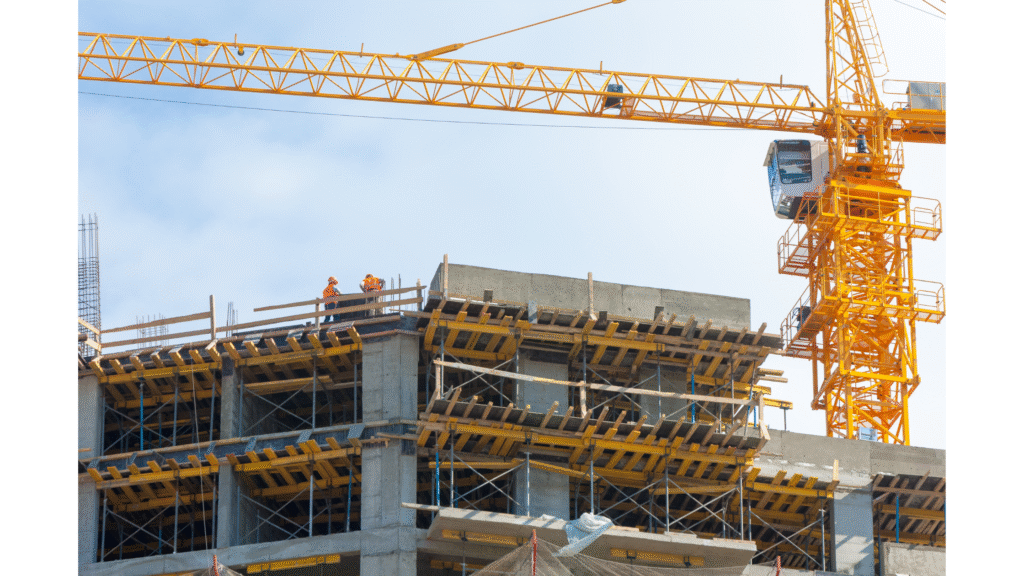
Labor costs are among the most significant budget line items in any commercial construction project. While experts project substantial growth in the industry over the next ten years, that’s not the whole story. Ambitious building projects require skilled hands to stay on track, something we’re missing in the United States.
Estimates point to a nearly 500,000-worker shortage in the skilled trades nationwide. Pair that with a shrinking pipeline of trainees and less interest among students, and we have a problem. A shortage of available workers inflates labor costs, driving up wages and the overall cost of doing business.
Different strategies to reduce the overall cost of a project run the gamut, but we’ve got one that might surprise you.
Read on to discover the role that premium fasteners play in increasing the value you get out of labor costs.

Medium- to large-scale commercial construction projects have complex budgets. From the beginning of the process with architects and engineers through to final inspections, each step is important. The role these individuals play in the design and implementation of a project is essential, but it’s far from the most costly line item.
Around 70% of construction companies will feel the effects of the nationwide labor shortage each year. General labor and skilled labor make up the most significant expenditure on personnel, and not by a small amount.
As you can see in this hypothetical construction project, the labor cost between these two groups is almost $311,200. At nearly half the total labor cost of this project, it’s a major investment. To get the most out of your team, efficiency is the key. However, there are some factors outside of your control that can balloon costs exponentially.
| Position | Hourly Rate | Hours/Week | Workers | Weeks | Total Cost |
| Project Manager | $65 | 40 | 1 | 26 | $67,600 |
| Site Supervisor | $45 | 50 | 1 | 26 | $58,500 |
| General Laborers | $25 | 40 | 8 | 20 | $160,000 |
| Carpenters | $35 | 40 | 6 | 18 | $151,200 |
| Electricians | $48 | 40 | 4 | 10 | $76,800 |
| Plumbers | $50 | 40 | 3 | 8 | $48,000 |
| HVAC Specialists | $45 | 40 | 2 | 6 | $21,600 |
| Concrete Workers | $32 | 40 | 5 | 4 | $25,600 |
| Roofers | $38 | 40 | 4 | 3 | $18,240 |
| Painters | $30 | 40 | 4 | 4 | $19,200 |
| TOTAL | $646,740 | ||||
| Numbers represent a hypothetical budget. For comparison only. | |||||
Construction projects rely on strict timelines to ensure maximum efficiency and productivity. When a site sits empty, waiting for the next crew, it feels like an eternity. A delay of even a few days is costly, and bottlenecks occur when there aren’t enough laborers. Fewer workers also translate to longer completion times, adding days or weeks to the schedule.
While these costs are hard to control, contractors can even see increases on the granular level. Less efficient tools and fasteners increase how long it takes for each crew to complete their tasks.
Over time, these costs can add to significant overages and unhappy supervisors, investors, and future tenants.

Spending time on an active job site, you’ll see some impressive fastener installations in progress. Throughout the construction process, different crews have varying needs.
On a large commercial project, for example, a 3-person drywall crew could go through upwards of 10,000 screws in a week. That breaks down to 12-14 hours a week if the crew is efficient. Real-world conditions are quick to throw off this calculus.
Pro-Twist includes advanced features in our fastener assortment to meet and exceed user expectations. We’ve engineered our products to include:
Choosing the best fastener for your trades ensures higher efficiency and less time on each drive. At scale, seconds matter and can significantly decrease your bottom line. Consider a fastener that’s 20% faster than competitor products.
That 12 to 14 hours a week becomes 9.5 to 11 hours instead, a savings of around 2 to 2.5 hours. Multiplied over the life of a large-scale project, and you’re looking at significant savings.
| Position | Original Cost | Updated Cost (10% Efficiency) | Savings (10%) | Updated Cost (20% Efficiency) | Savings (20%) |
|---|---|---|---|---|---|
| Project Manager | $67,600 | $67,600 | $0 | $67,600 | $0 |
| Site Supervisor | $58,500 | $58,500 | $0 | $58,500 | $0 |
| General Laborers | $160,000 | $144,000 | $16,000 | $128,000 | $32,000 |
| Carpenters | $151,200 | $136,080 | $15,120 | $120,960 | $30,240 |
| Electricians | $76,800 | $69,120 | $7,680 | $61,440 | $15,360 |
| Plumbers | $48,000 | $43,200 | $4,800 | $38,400 | $9,600 |
| HVAC Specialists | $21,600 | $19,440 | $2,160 | $17,280 | $4,320 |
| Concrete Workers | $25,600 | $23,040 | $2,560 | $20,480 | $5,120 |
| Roofers | $18,240 | $16,416 | $1,824 | $14,592 | $3,648 |
| Painters | $19,200 | $17,280 | $1,920 | $15,360 | $3,840 |
| TOTAL | $646,740 | $594,676 | $52,064 | $542,612 | $104,128 |
Let’s break down the different features that enhance efficiency in Pro-Twist fasteners.
Pre-drilling holes is one way to avoid splitting in wood substrates and can make drilling into metal more consistent. However, tool switching is a necessary step in creating pilot holes, and it is a significant time sink in large-scale projects.
Fasteners designed with self-drilling and/or self-tapping features remove the need for pre-drilling. They allow for one-step installation that won’t split wood and maintains consistency in metal.
Most job sites deploy pneumatic tool systems across trades. Lighter than electric tools, they’re seemingly everywhere. Pairing them with collated fasteners leverages their reliable power with convenience. Conversely, battery-powered tools aren’t tied to compressors or air hoses. They’re versatile and go to hard-to-reach places around your job site.
Collated nails and finishing brads have been around for a long time. However, collated screws are now more common than in the past. Pro-Twist collated drywall screws use flexible plastic collation to speed up your crew’s installation times.
Fastening plywood or OSB to metal framing requires specialized fasteners to drill through both materials. Pro-Twist’s self-drilling screws with wings are purpose-built for this type of application.
Wings remove the wood material and provide a clear path for the fine threads to pass through to metal framing members. Once the self-drilling point reaches metal, the wings burn off as they pass through.
So far, we’ve focused on installation speed, but corrosion resistance is a major factor in efficiency. It doesn’t matter how fast your crew is if they have to replace the fasteners prematurely due to rust. Not every application requires corrosion resistance. However, the right coating can prevent premature failure in areas with high moisture or exposure.
The most common coatings are:
We’ve outlined the significant challenges labor shortages present to commercial contractors for you today. Unfortunately, there are no indications that labor costs associated with hiring qualified crews will decrease.
Leveraging high-efficiency fasteners in your projects helps offset the increased labor costs and improve overall performance. With Pro-Twist on your job site, you have a brand that understands your challenges. Our commitment to innovation and reliability translates into cost savings across your budget.
Connect with one of our product specialists to learn more about how Pro-Twist sets the standard.